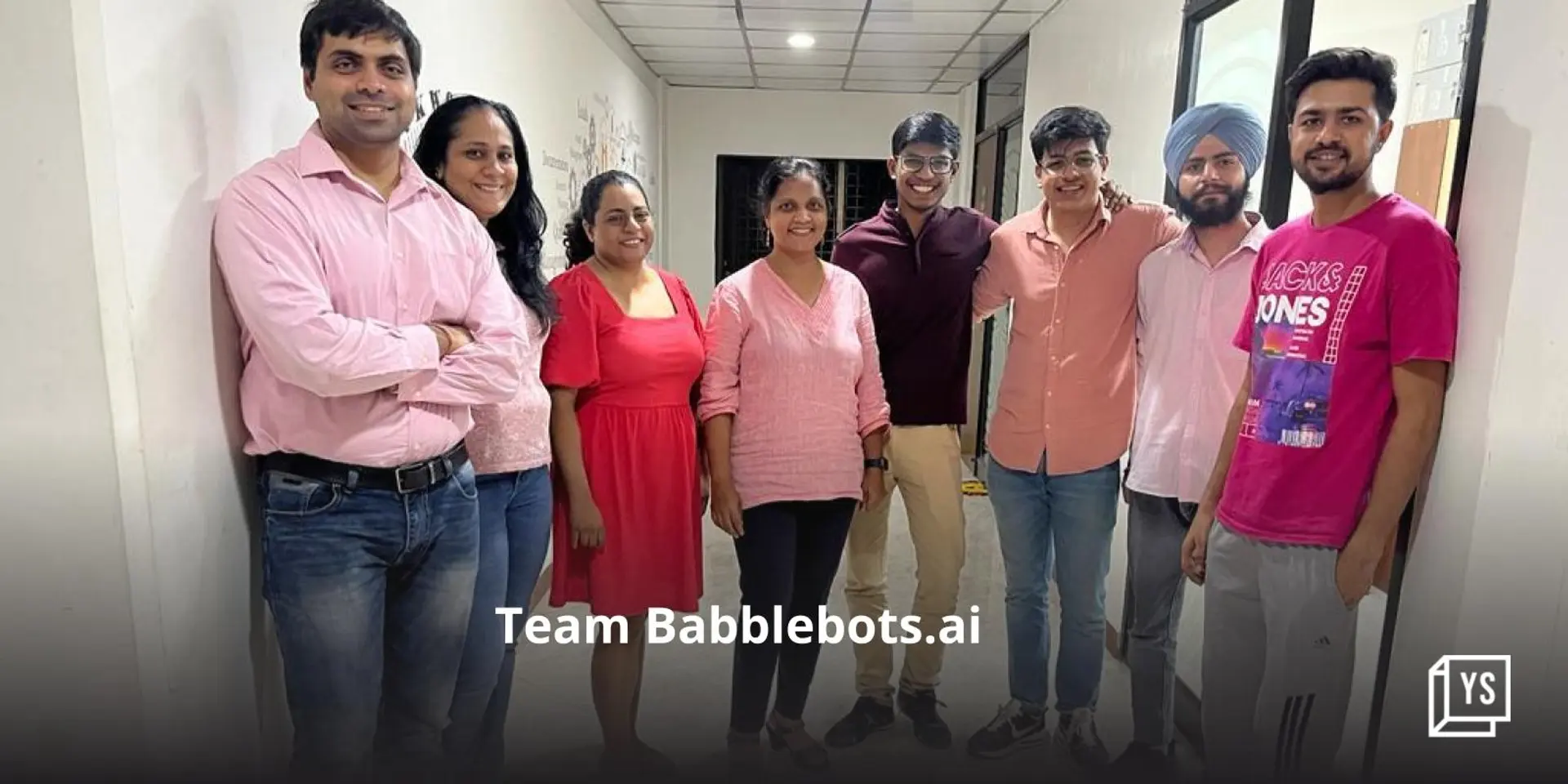Using GPT-3, AI and voice tech, this recruitment startup helps companies hire quicker
Founded in 2022, Babblebots.ai is a recruitment platform powered by GPT-3 and Speech AI. It has come out of stealth mode and raised undisclosed funding.
Mumbai-based has emerged from stealth mode after a year of development and testing with early design partners.
The startup announced raising undisclosed funding on Monday, February 13 from Rakesh Mathur (Gupshup, Junglee acquired by Amazon, Fizz Social App) and Rishi Deshpande (Chalo acquired by Booking Group, Whiterabbit.ai). They are both founding investors and advisors of Babblebots.ai.
Founded in 2022 by Roli Gupta, Babblebots.ai is a recruitment and talent acquisition platform that uses voice technology, conversational intelligence, and proprietary AI algorithms to interview and assess candidates for both technical and non-technical roles through 'AI-Recruiters'. It is powered by neural network GPT-3 (the technology behind ChatGPT chatbot) and Speech AI.
AI-Recruiters is a fully conversational voice bot designed to have a near real-life conversation with job candidates, answer their questions, and assess them for communication, technical and analytical skills.
Babblebots counts 15 companies, including large enterprises, SMEs and startups across the sectors among its clients. It claims to be onboarding 3-4 clients every month.

Solving for hiring
An IIT Bombay and UC Berkeley alum, Roli has almost two decades of experience across product and sales, including working on natural language processing (NLP) at InQuira (acquired by Oracle).
After working for software and renewable energy industries in Silicon Valley, she returned to India ten years ago to pursue entrepreneurship. Roli founded her first venture in 2015; Oorjan Cleantech offered roof-top solar solutions and was featured in YourStory’s Tech30 list of promising startups in 2017.
Working as SVP of Sales Training at edtech startup Toppr coupled with her experience in interview preparation from founding student upskilling platform gave her insight into large-scale hiring and training. Looking at the progress in large language models and generative AI coupled with her previous experience in NLP, she decided to solve for hiring. She started WynCareer in 2020 and build Babblebots.
How does it work
AI-Recruiters conducts human-like interviews for 200+ roles using long-form conversation voice bots in 20+ languages. They use a pool of 10,000+ questions across technical and analytical skills and are fully customisable for job roles, questions, and company branding. This reduces both the hours spent in scheduling and the number of interview rounds, thus speeding up hiring.
HR teams and hiring managers first send a customised interview link to multiple candidates via email and WhatsApp through the Babblebots platform, thus saving time. Without scheduling the interview, the candidates can talk to the AI-Recruiter and clarify their doubts about the role and company.
“Our AI-Recruiter interactions cover both soft skills and technical rounds in the same 15-minute interaction,” Founder and CEO Roli Gupta tells YourStory.
The recordings and their transcriptions are then sent to the company to analyse the candidate’s performance. Babblebot.ai’s AI-Recruiter also scores the candidate across multiple parameters like confidence, English proficiency, tech assessments, etc. The shortlisted candidates can then be invited for in-person interviews.
The objective of AI-Recruiters is to assess key aspects that are amiss in traditional CV-based screening through near-human intelligent voice conversations, reducing human bias and standardising the interview experience.
“We can assess subjective communication skills (such as English speaking quality and confidence or energy level) based on long-form conversation. Secondly, HR teams, which are typically non-technical, appreciate that we can assess technical skills given as part of the conversation,” she explains.
The startup claims that the process also improves response rates from candidates. “We also learn about the logistical preferences of a candidate around things like notice period, compensation, etc. In a 15-minute interaction, the company knows more about the candidate than it may sometimes do in 2-3 interviews,” says Roli.
The customer time is saved as 50% of the interviews are conducted during non-office hours and weekends, increasing the efficiency of talent acquisition teams and shortening the employee hiring process. This is one of the reasons why the startup claims its clients are closing positions in three days instead of 30 days.
“Instead of setting up in-person interviews with 10 candidates, hiring managers and HR teams can now only talk to the top 2-3 people and find their perfect hire,” she adds.
The challenges
Building the Babblebots stack involved solving many deep tech challenges across the domains of real-time AV, deep learning based speech AI, and transformer-based large-language models, says Roli.
The startup developed its product for a year to ensure that the candidates have a near-human experience while interacting with AI-Recruiters.
“This involved solving for low latency in varying internet speeds and supporting devices across phones and laptops. Simultaneously, we were building AI to understand the variation in Indian speech patterns and develop a capability to design conversations instantaneously to interview for all types of roles,” Roli explains.
The launch of OpenAI’s conversational AI ChatGPT changed customer expectations of conversational quality. So, Babblebots integrated with GPT-3 to bring depth to the interviews and have better conversational flows.
The startup had to also solve deep-learning AI models to accurately assess candidate responses in terms of both subjective communication qualities such as English speaking skills and confidence level, as well as objective qualities such as how well the candidate answers a domain-knowledge based question.
It took help from founding engineers from IIT Bombay and conducted thousands of AI-Recruiter interviews to build AI models in-house.
The startup currently has a team of ten members, mostly in product and engineering.
Business model and the way ahead
Babblebots.ai’s software-as-a-service (SaaS) product offers a monthly, quarterly or yearly subscription. Its trial subscription starts at Rs 24,000 for two months, processing up to 300 candidates.
Since its beta launch in Q3 CY22, the company’s AI-Recruiters have conducted thousands of interviews for trial partners and customers. These include enterprises like Mahindra Holidays, LG Soft, Great Learning, Paramount TPA, public institutes like IIT Bombay, and startups including SustLabs and Oorjan.
Pranjali Mishra, Sr HR Manager at SINE IIT Bombay attests to Babblebots’ product. “The functional screening became more efficient and we managed to close the position within two working days,” she says.
“At SustLabs, we have been able to make four offers for technical roles with a total effort of 5-6 hours,” Reedhima Mishra, Head of Talent, SustLabs adds.
According to Babblebots, data from these deployments show a 10x decrease in end-to-end hiring time and a 500% increase in the interview-to-offer ratio.
The startup plans to invest the fresh capital in product-led growth and deepening the technical moat around voice, AI and vertical ML for recruitment and people engagement use cases.
Speaking about its future, Roli says, “While we are currently focused on recruiting use-cases, our customers and trial deployments have already evoked interest in using our voice + ML + assessment expertise to solve other conversational interactions such as internal (continuous) training, employee engagement surveys, user-feedback surveys, and even exit interviews.”
Edited by Kanishk Singh




